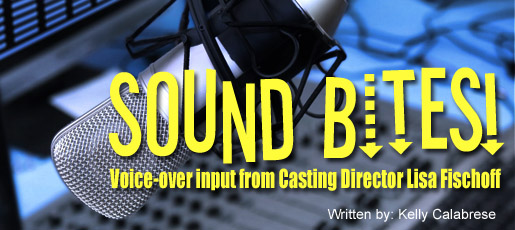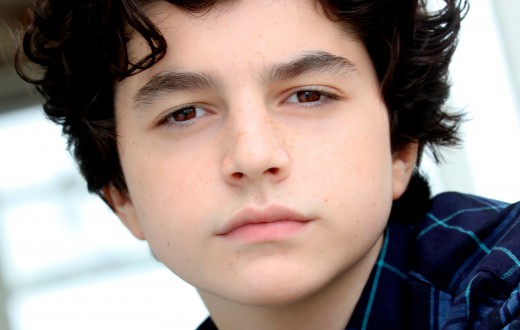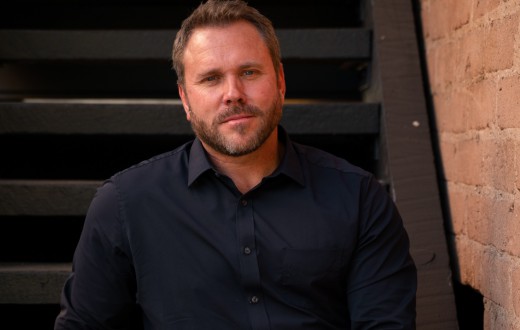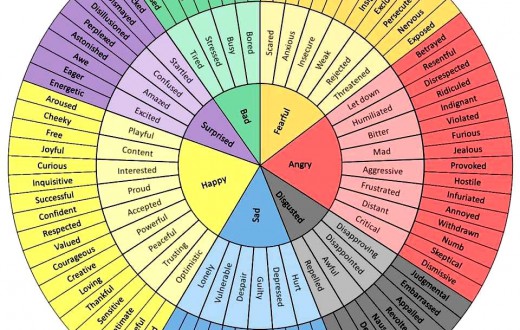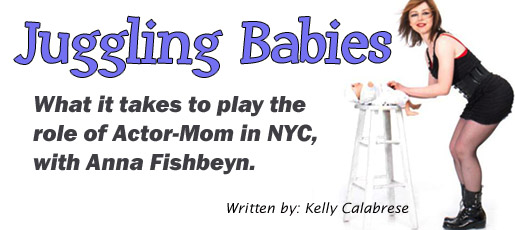You can fall in love with the voice-over craft, says Casting Director Lisa Fischoff who heads up Broadcasters, a division of Howard Schwartz Recording. Lisa notices a person’s voice before anything else. She has many years of casting experience, worked previously at Liz Lewis Casting Partners, and shares her expertise with NYCastings so that even more actors can become enchanted with the voice-over industry.
At her current office, Lisa casts on-camera and voice-over talent for commercial projects including American Express, Chrysler, Victoria’s Secret, Walmart, Verizon, Western Union, Level Vodka and JP Morgan, among many others. She also casts for independent features, short films, director’s reels and graduate student films.
If you are curious about voice-over, want to learn a lot and have fun, you can take one of Lisa’s classes in New York.
And for your immediate listening pleasure, please enjoy these in-depth questions and answers from our conversation…
How does one learn what their voice type is?
If you have a lot of texture or youth to your voice that would be considered hip, youthful, quirky. If someone is more in their 40’s or 50’s and has a very soothing voice that would be a mom vocal type; a nurturing, soothing, credible vocal type. Same thing with men, if they have a lot of gravitas, that doesn’t necessarily mean deep but it means there is a lot of weight to the voice, then there’s a presence, an authority to the voice. These are all words that are used constantly by our clients and agencies that are looking for vocal types.
Is reading voice-over copy the same as reading sides – meaning do you create back-story, etc?
One of the downfalls an actor can bring to an audition is overworking copy. The microphone picks you up so intensely that a natural sound can be really gone quickly if you overwork it. The trend is natural – conversational, unless it’s a character spot. I have to believe what you are saying.
How does a voice-over audition differ than an acting audition?
You have to realize that voice-over auditions have nothing to do with what you look like so that’s number one. It’s all the voice. It’s not mannerisms. If you talk with your hands, that’s what you should do. For on-camera, if you have to hold a product they are not going to want you moving around. But for voice-over, as long as I don’t hear you banging something and it doesn’t bleed into the sound, do what helps you sound more real. It’s about connecting with how loud you are. Am I projecting too much? Am I too intimate? Am I too soft? Am I hitting words too hard? Am I sounding like an announcer? These are all ways of exploring technique when you get into training. Also, you never get the copy before the audition as you do with on-camera unless it’s something specific like a language you have to practice.
How many takes do you get?
I never give less than two takes. Sometimes 3,4,5. It depends on the amount of direction, how close I think the actor is getting to what I am looking for. I may not keep all five but I never submit one.
Voice-over seems like quite a different animal than on-camera?
It is a different animal and it’s not easy to break into. But I do think the market has opened up a lot and it’s not the core people anymore. It’s opened up to comics and improv people. Just because of the nature of spots being comedic, very real people who might not have had a shot of breaking into this core group of people are. It has become pretty diverse.
Does spontaneity help make for good voice-over (VO) work?
I think so. I have people that look at it once and that’s it and I have people who go into the bathroom and mark it up and it’s what works for them. Each is good in its own way. But I think when you are starting out you can really get in your own head if you think what seven ideas can I bring to this.’ You have to be open to a casting director throwing out to you an idea that isn’t on your page. It’s important to be open and to connect with the copy even if you think it’s a poorly written or you don’t like the storyboards. If you don’t connect, it’s really audible.
Why should an actor learn about VO?
I think that New York talent is stellar. I think if you have a desire to do this and you are willing to work hard it can be so much fun. The community of actors here are great, welcoming and very approachable. It’s a family. But it’s a really talented family. So that said, if you are serious about it you must constantly hone your craft, work on auditions and your vocal style. Listen to television and commercials.
Is there a lot of VO work in NY?
There is a lot of opportunity here for voice-over work. There is a lot of radio here too. We had a great year last year. The economy was rough for some but I am sensing an energy this year that things are going to be better. People are auditioning. People are casting.
Is there a high-season for VO work?
People ask that a lot and I really don’t think so. Holiday season is big but so is back to school and after holidays. We had an August that was so insanely busy it was our best month in years. At the end of December, things do slow down a little. But this is a business of feast or famine all the time.
Are there certain voices in high demand?
Yes, but the ages have broadened a lot. When I first started doing this it was 20’s, 20’s 20’s. But now our clients want us to cast 20-40’s or 30-50’s. It’s a broad range because they are not sure what is going to fit. The natural vocalist is still very much in demand, the conversational read, the person who does not sound like a big booming announcer. That’s not in vogue anymore unless it’s a character. It’s down to earth, matter-of-fact, laid back. Authoritative voices are also in demand for banks and pharmaceuticals, those kinds of products.
Is VO more AFTRA or SAG?
Its AFTRA and SAG. AFTRA is radio. SAG is TV. When I cast for a TV voice-over they can go through AFTRA but I would say that 95% of the time they go through SAG.
Are there more union versus non-union jobs in VO?
There is more union work but we cast for both and as a non-union actor you can audition for union work you just have to be prepared to join if you book a job. You should tell them you aren’t union and all they have to do is waver you. It has to be done before you do the job. And make sure you have the dues set aside.
Do actors need a demo in order to audition?
I think it’s very important especially when you get signed because many times I will see a person’s name on a list and I don’ know who they are. As much as I might ask their agent what their vocal type is, their quality, their age – I’d love to hear a sample. The other trend that is happening is that some of our clients might not have it in their budget to do a casting session. They might book straight from a demo. They might say send me five women in their late 20’s, youthful, fun and we will book from the demo.’ So if you don’t have a demo, I can’t book you even if you are perfect for it.
If you want to make a demo, why you should wait until you get a solid amount of training?
Putting a demo together when you have’ had enough training is the worst idea an actor can have because you really don’t get more than one shot. You can’t keep redoing your voice-over demo. Despite the fact that it’s really costly (anywhere from $500 to $1000), I might listen to you and say I thought this demo was terrible’ and then a couple months later you send me a new one and I don’t know if I would listen to it. A headshot is different because you have to change your headshot every couple of years. And you get more work and put it on your resume. It’s different with voice-over work. It’s really specific and you have to think to yourself is this is as competitive as what I hear on Voice Bank?’
How much training does an actor need?
It depends on the actor. That’s really difficult to pinpoint. Some people are ready in a month, some in three. If you are going to make a voice-over demo, you really have to work and practice.
Has the web increased work in voice-over?
Yes. The web is a really new avenue that we find interesting because all of the rates are negotiable. There is no set rate for talent when talent books a job. It depends on when its running, on how many years its going to be on. Is it downloadable? Is it going to be on the big sites like YouTube and Hulu? So it’s interesting because the negotiating is a lot more intense. Anything from industrials on the internet to commercials are all different rates. It’s definitely increasing work and it’s a new avenue that can be lucrative.
Can you get a video recorder and listen to yourself as practice?
Use an audio recorder or the computer. It’s so easy to record now and play it back. You can also rent out a really inexpensive recording studio with your friends and do copy. Listen to each other. Practicing is really important. Even the most talented people, who work all the time, have to keep practicing.
Is there a lot of work for children in VO?
Yes, we cast a lot of children. There are some great kids here, kids that come from theatre and acting schools. On-camera we need an adorable kid and they have to look a certain way. With voice-over it’s what they have to sound like. When I run a kids session I know who nailed it, who can take direction, and who can stay in a studio for over an hour. That’s a big thing with kids. The parents will go to the session but usually won’t sit in unless the producers invite them and with auditions the parents don’t sit in. I love working with children and the most important thing is that the child wants to be there.
Why do you partner with Elizabeth Bunnell (Independent CD) in teaching VO classes?
Elizabeth and I worked together at Liz Lewis Casting for many years and we started this class together while there. We work really well together. We don’t always agree with each other, which is very interesting. We don’t confuse anyone but there are different perspectives that we have on the process, or talent, or what kind of age range a person would be able to do. To get two opinions gives more to an actor. And, when you go out for an audition a bunch of people are going to listen to your audition so it’s helpful for actors to hear this is what we both think’ and be able to interpret what to do.
Can you immediately spot who will be good at VO?
No. I have had students that I said to myself wow this person probably won’t go further than this class’. And some actors really surprise us on how they improve in four weeks. People can surprise you, if they really work on their craft. I listen to people’s voices all the time. It’s the first thing I notice about anyone I come into contact with. And its not about having a cool, hip sound. It’s about having a real sound that we want to listen to, that can be quirky, comedic. So I can’t immediately tell. You never know.
What do you teach in your classes?
The one night seminar teaches single person copy and is most mostly for those looking to try it for a night or those who need a brush up.
For the four week class, it gives intense information about the industry. We work on single person copy and demos. We work on everything from timing to range. We also venture into partner copy so you learn to work with someone, manipulate the microphone together. As important as it is to know what to do it’s equally as important to know what will make someone stop listening right away.
Is the class set up similar to how one would audition?
Yes. There is a sound booth, headphones. Headphones can be intimidating. Students learn how to manipulate their voice with projection. If we didn’t have a studio booth our students wouldn’t really get the feeling of what it would be like when you actually go into an audition.
Do you provide demos from the class?
The call sheet says that your voice-over demo is like your headshot 75 fold meaning hat it’s that much more scrutinized. It’s your tool to market yourself. We don’t provide demos at the end of a four week class because we think it’s wise to go onto some couching or a class with someone else because you only get one shot and it’s very competitive.
Do you offer private coaching?
We do offer private couching. And we always refer studios to our former students, if they decide to get a reel done on their own, so that they won’t walk into a place they don’t know that might rip them off. We also encourage them to send us, before they send it out into the world, a final MP3 of what they’ve done and maybe we will move spots around. We might say maybe you should stick a PSA in there because you have a really warm, caring sound. Or, I am not sure if the CoverGirl would be for your age.’ We try to skew you toward what we think you will excel with.
Your classes are by referral only, what if someone reading this at NYCastings is interested in learning from you?
Our next class is full but we are going to start another 4 week in April. We have one night classes that we usually don’t do until the summer but we have had a lot of requests for them so I do have some spaces on Feb 26th and March 2nd. If anyone’s interested the best way to reach us is to email me (Lisa Fischoff) at lisabc@hsrny.comor Elizabeth Bunnell – ElizabethBunnell@yahoo.com.
Even though these classes are referral only, NYCastings members can contact Lisa directly. She is more than happy to get NYCastings members on her list.

